Editor’s note: The Senate Assembly will elect three Senate Advisory Committee on University Affairs (SACUA) members at its March 22 meeting. The three top vote getters will win three-year terms. Additional candidates may announce intent to run up to the time of the election. Biographical information and position statements supplied by candidates follow.
Gonçalo Abecasis
Appointment: Felix Moore Collegiate Professor of Biostatistics, Department
of Biostatistics, School of Public Health (SPH)
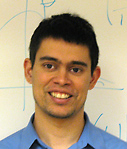
Abecasis. Courtesy Gonçalo Abecasis.
Education: Bachelor of Science (Honours), Genetics, University of Leeds (U.K.); Doctor of Philosophy in clinical medicine/human genetics, University of Oxford (U.K.)
Faculty Leadership: Leads a small research group at SPH. His research and teaching integrates statistics, computational biology, genetics and medicine. He has co-authored more than 140 research papers. He has served on multiple committees at U-M, SPH and the Medical School, including committees focused on academic curriculum, academic rank and tenure review recommendations, and on furthering the university’s research mission.
Statement of candidate: “(I) will energetically defend faculty interests, which include not only compensation, benefit and retirement packages compatible with a world class university, but the maintenance and furthering of an environment that encourages high-quality, innovative research and teaching. While cost cutting pressures cannot be ignored, it is vital to the university’s mission that academic freedom, in both research and teaching, should be maintained and that individual faculty members should be encouraged and supported in their active contributions towards the university’s excellence in teaching and research.”
Kate Barald
Appointments: professor, Department of Cell and Developmental Biology, Medical School; professor, Department of Biomedical Engineering, College of Engineering; associate director of the Program in Biomedical Sciences; faculty member in Cell and Molecular Biology and Neuroscience Programs; associate director, Michigan PREP (National Institutes of Health post-baccalaureate program for under-represented minority students), 2009-present; director, Research Responsibility and Ethics for Graduate students and fellows in the Sciences, Social Sciences and Engineering (also NSF PI for this effort, 2009-11).
Research Interests: Biomedical engineering approaches to regenerative medicine in the auditory, cardiac and nervous systems.
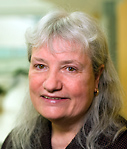
Barald. Courtesy Kate Barald.
Education: Bachelor of Arts in biology, with honors, Bryn Mawr, 1967; doctorate in molecular biology and immunology, University of Wisconsin, Madison Cancer Research, (elected to Sigma Xi), 1974; MDA Postdoctoral Fellowship, neuroscience, University of California, San Diego, 1975-78; NIH NRSA Postdoctoral Fellowship, developmental neuroscience, Stanford University, 1978-80.
Faculty leadership: Appointed: chair, Provost’s Committee on seventh-year faculty reviews, 1995-97. Elected: Senate Assembly, 1982-85; Research Policies committee, UMMS, 1999-2003; Biomedical Research Council, 2004-07: vice-chair, 2005-06, chair, 2006-2007; Advisory Committee on Appointments, Promotion and Tenure, Medical School, 2005-08; Rackham Graduate Executive Board 2006-09. Senate Assembly Committees: Financial Affairs Advisory, 1986-88; 2009-present; Academic Affairs, 1992-94; Research Policies Advisory 2004-07, 2009-present; EVPMA advisory 2009-present; Tenure: 1995-97, 2004-07; Other: U-M AGEP alliance, 2005-present; Rackham Graduate School Grievance Committee, 2005-09; Bouchet Society Advisory Committee, 2008-present; faculty search committees (11), including departmental chair search committees (3), presently co-chair KHRI directorship search committee; national grant review panels and study sections: NIH, NSF, DOD, foundations (U.S.) (14); chair CDMRP NF1, 2009; IOS NSF, 2009-present; international (7).
Awards: U-M: Distinguished Faculty Recognition Award, 1987; Senior Fulbright Fellowship to Australia, 1990-91; NIH Career Development Award, 1996; Instructor of the Year Awards, UMSD, 1998, 1999, 2000, 2002, 2003 and 2004; Elizabeth Crosby Award, 2004; Sarah Goddard Power Award, 2006; Inaugural Rackham Graduate Mentoring Award in the Sciences and Engineering, 2006; AAAS Electorate Nominating Committee of the Section on Biological Sciences, 2007-10 (national election AAAS); Undergraduate Research Opportunity Program Faculty Recognition Award for Outstanding Research Mentorship, 2007.
Statement of candidate: “In the current funding situation at the university, state and national levels, we need to take creative approaches to insure the strongest possible academic, research and living environment for everyone at Michigan from our students to the emeritus/emerita faculty. Maintaining diversity and excellence at all levels is of the greatest importance. SACUA provides a conduit for the informed voices of all the faculty to the administration, not just that of any one school, college or group.”
Dr. Laurence Boxer
Appointment: professor, Department of Pediatrics, Medical School.
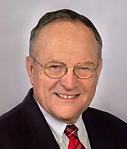
Boxer . Courtesy Laurence Boxer.
Education: Bachelor of Arts, history, University of Colorado, 1961: Doctor of Medicine, Stanford University, 1966; residency in pediatrics, Yale-New Haven Hospital, 1968; senior resident in pediatrics, Stanford Hospital, 1969; fellowship in pediatric hematology/oncology, Children’s Hospital, Boston, (Harvard University) 1975.
Faculty leadership: Chaired Elsa U. Pardee Cancer Fellowship Selection Committee, 1983-84; member, Task Force for Development of Cancer Center, 1985; member, Advisory Committee on Appointments, Promotions and Tenure, Medical School, 1985-87 and chairman, 1987-88; Executive Committee, Medical School, 1991-94; member, Tuition Merit Review Committee, 1993; member, Advisory Committee on Appointments, Promotions and Tenure, Medical School, 1995-98; member, Cancer Center Operations Committee, 2001-07; member, Admissions Committee, Medical School, 2001; member, Executive Committee, Medical School, 2003-05; member, Subcommittee on Dean’s Business Operation, Medical School, 2005-07; member, Subcommittee on Dean’s Medical School Research, 2005-06; member, Provost Committee for Promotion and Tenure, 2006-07; member, Senate Assembly, 2006-09; member, Medical Affairs Advisory Committee of the Senate Assembly, 2008-present; chair, Medical Affairs Advisory Committee, 2009-10; president, Society for Pediatric Research, 1985-86; councilor, American Society of Hematology, 1988-92; councilor, American Pediatric Society, 2001-06; Member of the Executive Board, American Society of Pediatric Hematology/Oncology, 2005-08.
Statement of candidate: “The development of research at the North Campus Research Complex (NCRC) represents a wonderful opportunity for SACUA involvement. Already plans are underway to expand health services, research and to technology anchors at NCRC. There are calls for proposals to form interdisciplinary research clusters at NCRC to join the technology anchors. As a long-standing member of the Medical Center, it would be my privilege to link other programs at the university with ongoing biomedical research programs at NCRC. For instance, SACUA could play a role in suggesting involvement of biology, chemistry, bioengineering, as well as the Law School in interfacing with future research programs at NCRC. Given my familiarity with the programs at the Medical Center, I believe that I could facilitate interactions with other schools at the university with the proposed programs of the NCRC.
“The faculty needs to be continuously involved in the redesign of future benefits awarded to both faculty members and retirees. These include health care benefits and non-salary compensation. It is vital that SACUA carefully monitor the proposed changes for the research changes for the benefit program.”
Rachel Goldman
Appointment: professor, Department of Materials Science & Engineering (MSE), Department of Electrical Engineering & Computer Science, and Department of Physics.
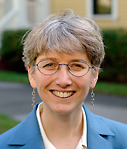
Goldman . Tony Rinaldo Photography.
Education: Bachelor of Science, physics, U-M, 1988; Master of Science, applied physics, Cornell University, 1992; doctorate, materials science, University of California, San Diego, 1995.
Faculty leadership/governance experience: Academic Senate Assembly, 2002-05; Executive Committee, Applied Physics, 2002-05; Rackham Divisional Board, 2003-05; College of Engineering International Programs Committee, 2004-present; MSE Advisory Committee, 2007-present; MSE graduate chair, 2008-present; associate director, Center for Solar and Thermal Energy Conversion (Department of Energy’s Energy Frontiers Research Center), 2009-present.
Statement of candidate: “Historically, the administration of U-M has been distributed, with local autonomy at the unit and department levels. Thus, the faculty and administration at U-M are actively engaged in local shared governance. Increasing budgetary pressures are likely to move our university to a more centralized mode of operation. Thus, collaborative governance between the faculty and central administration will become increasingly important. For example, continuous improvement in the communication of local needs to the appropriate channels will be needed. As a member of academic communities on the north and central campuses, I welcome the opportunity for active participation in collaborative governance. I am honored to be considered for service on SACUA.”
Kimberlee Jane Kearfott
Appointment: professor, nuclear engineering radiological sciences; professor, biomedical engineering; professor, radiology; faculty fellow in Graham Environmental Sustainability and Michigan Memorial Phoenix Energy Institutes.
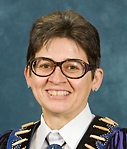
Kearfott . Scott Soderberg, U-M Photo Services.
Education: Bachelor of Science, general engineering, St. Mary’s University, Halifax, Nova Scotia, 1975; Master of Engineering, nuclear engineering, University of Virginia, 1977; Doctor of Science, nuclear engineering (medical physics and radiation safety), Massachusetts Institute of Technology, 1980.
Faculty Leadership: Senate Assembly, 2008-11; SACUA Committee for a Multicultural University, 2008-present; SACUA Government Relations Advisory Committee, 2008-present; executive council and/or vice president U-M American Association of University Professors, 2005-present; SACUA Grievance Procedures Task Force, 2006-07; U-M Radiation Policy Committee, 1999-present; adviser to Student Alliance of Gay Engineers, 2008-present; College of Engineering Diversity Outreach Council, 2006-08; Arizona State University Faculty Senate and Chair of Committee on Committees; Arizona State University Executive Committee (equivalent of SACUA); board of directors, American Nuclear Society; board of directors, Health Physics Society; vice president, International Radiation Physics Society; Society of Nuclear Medicine Positron Emission Tomography Task Force.
Statement of candidate: “As the granddaughter of a gentleman who had his tenure revoked for teaching evolution in a religion class, I hold a deep personal commitment to the concepts of academic freedom. In the modern academic world, these concepts face many challenges, including the protection of intellectual property (patents and copyright policies), and the complexities of funding in an intensely specialized and focused research environment. I am also aware of the need for a completed revision of the faculty grievance process, which I helped initiate several years ago. In addition, continuing economic pressures within the state and beyond have the potential to impact benefits, salaries, well-being and retention of faculty, not to mention our students.
“In the upcoming years, a strong but reasonable voice for faculty will remain essential for optimal university administrative decision making. I intend to provide a positive, creative voice responsive to the faculty as a whole, irrespective of difference in academic discipline and other circumstances, which can work effectively with the existing administration and executive structures.”
William Schultz
Appointment: professor, Department of Mechanical Engineering, Naval Architecture and Marine Engineering.
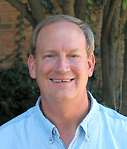
Schultz. Courtesy William Schultz.
Education: Bachelor of Science in mechanical engineering, 1974, Master of Science in Mechanical Engineering, 1976, Purdue University. Doctorate in applied mathematics and engineering sciences, Northwestern University, 1982.
Faculty leadership: undergraduate admissions faculty, 2003-05; Interdisciplinary Program adviser, 2001-06; undergraduate program adviser, mechanical engineering, 1995-97; director, Fluid Dynamics Program, National Science Foundation, 2006-09; U-M Engineering/Science/Mathematics Committee, 1985-87; ASME U-M faculty adviser, 1994-2004; MEAM Undergraduate Program chair, 1995-97; MEAM Advisory Committee, 1996-98, 2000-04; founder, Science Club for students at risk in Ann Arbor Public Schools, 1997; College of Engineering (CoE) MLK chair, 1997-98; CoE Curriculum Committee, 1998; CoE Rules Committee, member 1999, chair 2000-02; Center Research on Learning & Teaching Faculty Advisory Committee, 2000-02; Academic Affairs Advisory Committee, 2000-04, chair 2001-04; co-founder, Program for Civic Engagement in Engineering Design, 1998; Senate Assembly, 2004-07; Center for Institutional Diversity Steering Committee, 2004 to present; Ginsberg Center Long-Range Planning Committee, 2005; U-M Residency Appeal Committee, 2005-06; ME Undergraduate Program Committee, 2009 to present; U-M Research Policy Committee, chair, 2009 to present; CoE Nomination Committee, chair, 2009-10.
Statement of candidate: “I have been the chair of two SACUA committees, the Academic Affairs Advisory Committee during the U-M admissions Supreme Court decision and the Research Policy Committee during the NCRC move-in. While most of our senior administrators are faculty members, the spirit of the university bylaws is best met with regular consultation with faculty, having day-to-day teaching and research responsibilities. I believe that SACUA leads this important role — looking out for faculty interests as well as the university as a whole. I am especially interested in helping form policies on interdisciplinary initiatives, IT issues and sustainability.”
Greg Wakefield
Appointment: associate professor, Department of Electrical Engineering and Computer Science (EECS).
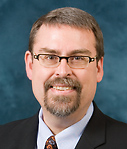
Wakefield. Scott Galvin, U-M Photo Services.
Education: Bachelor of Arts, psychology and mathematics, University of Minnesota, 1978; Master of Science, electrical engineering, University of Minnesota, 1982; Doctor of Philosophy, electrical engineering, University of Minnesota, 1985; Doctor of Philosophy, psychology, University of Minnesota, 1988.
Faculty Leadership: graduate chair, EE: Systems, 1994-98, 2002-03 (interim); EECS Graduate Affairs, chair (1996-99); Media Union Creative Arts Faculty Advisory Group — CoE representative. (1996-98); EECS Departmental Chair Search Committee, 1996-97; EECS Executive Committee, 1997-99; Otolaryngology Research and Training Committee, 1998-2002; CoE Scholastic Standing Committee, 2000-02; Dean’s Advisory Committee on the Media Union Midway, Dean Bryan Rogers, chair, 2001-02; Office of the Vice President for Research’s Research Review Committee, 2002-present; Rackham Executive Board, 2003-06; EECS Curriculum Committee, chair, 2004-present; Faculty Senate, 2006-09; ABET Coordinator: EE, 2005-present, CE, 2006-present, and CS, 2007-present; Engineering Global Leadership Steering Committee, CoE, 2006-10; Inter-Arts Advisory Committee to the Provost, 2007-08; SACUA Academic Affairs Advisory Committee, 2007-present, chair, 2009-present; CSE representative, CoE Curriculum Committee, 2007-present; CoE International Programs Committee, 2007-present.
Statement of candidate: “My service on the Rackham Board, the AAAC and other cross-unit activities, has taught me the utmost respect for the integrity of our colleagues who now serve in administration. Similarly, I have seen, first-hand, the importance of faculty governance at the University of Michigan and its role in maintaining the academic qualities of what we value as faculty. In the best of times, we all know that even the most draconian of administrative decisions rarely has a lasting impact. When budgets are flush and the prognosis for funding is overwhelmingly positive, there is always enough money to patch over and eventually make up for local cuts. Today is hardly the best of times at our university; in times like these, even the seemingly most benign decisions by administrators can cause a variety of unforeseen effects with lasting, negative impact, and little hope for recovery. As early as 2003, my first year on the Rackham Executive Board, I have heard the concerns of administrators and faculty alike about budget shortfalls and the need for improved efficiency in our activities. At that time, we believed these setbacks were temporary. As we now understand, the shortfalls have worsened.
“We should take pride in the fact that our sister institutions across the country have recently turned to Michigan as a source of best practice for dealing with their budget crises. The collective wisdom of our faculty leadership and the administration has helped preserve the quality of education and research under very difficult times. But all of this has negatively impacted those less easily measured qualities of our academic community. Our time to professionally reflect, learn and explore has been eroded, and in its place we have been asked to embrace the alleged efficiencies of cumbersome information management systems. Our days are taken up with duties that were more efficiently handled by staff, whom we can no longer afford. Our long-term commitment to the institution of tenure has, in some units of our community, been supplanted by the institutionalization of short-term, quick-return, bottom line academic management practices. We are being asked to back away from our commitment to our collegial family, particular those who have retired, because the costs are no longer affordable. These are just a few of the many qualities of our academic community that have declined in the past decade. If elected, I would continue as I have throughout my service to inform, debate, question and learn from my colleagues and our administrators in protecting the integrity of the core of our university’s life.”

